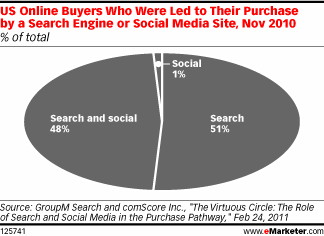
Search & Social Influence - eMarketer
Reuters posted an article yesterday entitled, “Is SEO DOA as a core marketing strategy?” and trust me, I know better than to respond and fuel attention to a writer who is either naive or trying to stir up the bee’s nest with a contrarian title. I suspect there may be a bit of both in this situation. Basically, the article makes the argument that entrepreneurs “may want to reconsider pouring money into search engine optimization (SEO) as their primary marketing strategy” based on an ill conceived post by Chris Dixon “SEO is no longer a viable marketing strategy for startups”. The reason I am posting about another “SEO is Dead” diatribe, is that with the right context, I would agree.
Before you think I’ve turned coat away from SEO, read my comment in response to the Reuters SEO is DOA post:
If you don’t want prospects, customers, investors, marketing partners, job candidates or journalists to find your content via search, then by all means – don’t even bother with SEO.
As a standalone tactic, (which is not the same thing as core) SEO is not what it was a few years ago and that is a valid point.
As others in the article state, SEO works in conjunction with other marketing, advertising and public relations tactics to achieve business goals. To work best across disciplines, SEO needs to be a core principle in online marketing since it affects discovery anywhere something can be searched on – including social networking and media sites.
If a business isn’t optimizing for improved findability, one needs to wonder what they’re hiding from?
For some reason, there’s a set of people in the biz media that like to focus on a small segment of opportunists making big claims with no skills about SEO vs. the thousands of professionals that are making a huge impact on companies’ bottom line. The fact that there are a few misrepresenting the whole is no different than any other industry whether it’s PR, legal or car repair. Making the effort to understand what SEO really is can help those who are not practitioners, but in a position to write about it, see the difference between the exception and the rule.
I’ve been providing SEO services since 1997 and like other industries, SEO has changed. Stand alone SEO only makes up a small percentage of our current consulting engagements. Most of what we do includes SEO as an element working in concert with social media, content marketing, email, PPC, social advertising and online PR. Companies that want us to “just optimize” their site are met with questions about how much revenue they’d like to grow. Then we work backward from those goals and develop the appropriate strategy and mix of tactics, which often includes SEO.
Masterful SEO practitioners possess a unique set of skills ranging from technical to creative. As technology and consumer behaviors online have changed, so have SEO best practices.
Search as a means of discovery is massively popular. Google sites alone handle over 88 billion queries per month. The sheer volume of content being produced can possibly be filtered in a qualitative way by personal recommendations on social networks. Search plays an essential role for people that need to find answers whether it’s on a standard search engine like Google or Bing, the internal search engine on Facebook or YouTube, or on mobile devices. In fact, search engines are the most popular destinations on smart phones, not social networks.
For many businesses, SEO is absolutely the most viable core marketing strategy. And that strategy often includes working in concert with other marketing tactics such as PPC, content, display and email. SEO and nothing else is a disadvantage compared to SEO that is amplified by a robust social media and content marketing program.
As long as there are consumers in need of search engines, there will be a demand for expertise that helps brands surface their relevant content where people are looking. If a company’s target audience is prone to use search for information discovery, then building a website with search in mind is absolutely a best practice. As I mentioned in the Reuter’s comment above, if a website isn’t optimizing content so prospects and customers can easily find their content, what are they hiding? What’s the point of having a website?
If you’re a client side SEO practitioner or if you work at an agency as an SEO, what is your mix of stand alone SEO projects vs. SEO working in concert with other marketing?


